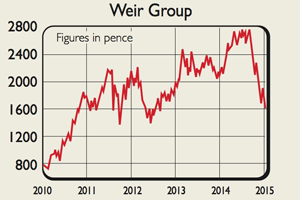
Buy when there’s blood in the streets, said Baron Rothschild roughly two centuries ago. Buy at “the point of maximum pessimism”, was how legendary investor John Templeton put it a little more recently. Both were recommending contrarian investing – or betting against the crowd.
This can be a very successful investment strategy because investors tend to behave like herds of animals. When the outlook is grim, they sell shares and push their prices down – often to overly depressed levels. And when the outlook is good, they pile in and drive them to ever more expensive levels.
At the moment there is lots of pessimism in the oil and mining industries, with oil and commodity prices plunging. This is also bad news for any company that sells equipment to oil and mining companies, such as Glasgow-based pump maker Weir Group (LSE: WEIR).
Its shares have fallen by more than 40% since last July. The grim sentiment, plus the huge share-price fall, indicates that buying Weir now would certainly be a contrarian act. But is it a good idea?
Until last summer, Weir had been a star performer, benefiting from the US shale-gas boom. Earnings had grown at a decent clip for several years. But now oil explorers and miners are cutting back on spending – and that means lower sales for pumps and valves.
So you can see why investors have sold out, and I think it’s fair to assume that Weir will not escape the current turmoil unscathed. I’ve also no idea whether its share price will continue to go lower in the months ahead – the point of maximum pessimism may well be yet to come. So the easy decision would be to avoid or sell its shares.
But a look at the company’s financial performance over the last decade suggests that Weir is a very decent business, as evidenced by its sustainably high return on capital employed. This has been achieved despite the financial crisis and a tendency for it to splash out on buying other firms.
You don’t often get the chance to buy quality businesses like these cheaply. At 12.7 times 2015 estimated earnings per share, the shares aren’t dirt cheap, but they could look oversold if commodity and oil prices bounce.
I don’t think Weir’s profits will collapse. A large chunk of its income comes from selling services such as maintenance and spare parts – a part of the business that’s still growing. It also doesn’t have huge amounts of debt and so should be able to weather the current storm comfortably. Even if you don’t want to buy Weir shares now, they are definitely worthy of a place on your watchlist.
Verdict: a high-risk buy